- Home
- A. G. Riddle
The Solar War (The Long Winter Book 2) Page 6
The Solar War (The Long Winter Book 2) Read online
Page 6
The previous impact was a hollow boom and a rumbling.
This strike hits like a cannon ball into a car. The ground bounces us like a trampoline. I hold Allie as my back hits the bottom of the bunk bed above and we fall back. Lights flicker. Dust fills the air. My ears pop and ring for a long moment. Sound returns like the volume on a speaker being turned up. Screams and crying are all around me.
“Madison!” I shout, unable to see her. My voice sounds quieter than I expect. So does hers, as if it’s muffled.
“I’m okay. You?”
“Yeah.”
I peer down at Allie, who’s still and quiet, her face tucked into the crook of my neck, as if hiding from the danger around us. Her chest is heaving. She’s alive.
“Sweetie,” I whisper, peeling her back from me. Her strength is amazing as she clings to me. “Sweetie, I need to see if you have a boo-boo.”
“Da?”
I’ve held it until now, but the levee breaks and the tears come and they won’t stop. I don’t answer because I don’t trust my voice. That will only upset her more.
The good news is that she’s okay. There’s a bruise on her thigh, but it doesn’t need treatment. Others weren’t so lucky. Beyond this bunk room, I hear them calling out for help.
For a long moment, I hold Allie and stroke her hair and wonder what life will be like now. The world has just been destroyed. Again. Before, during the Long Winter, we had something to work from. We had a chance.
Now, I’m not so sure.
The first time I hear my name being called out, I think I’m imagining it. Then he calls again, “Emma!”
“I’m here!” I yell, voice scratchy.
A figure cuts through the haze in the room, swatting the dust away. His face is bruised, hair mottled with sweat and dust. But James is alive. He must have gotten down on the last elevator trip, right before the impact. He bends down and hugs us, and I’ve never been so thankful in all my life.
Chapter 11
James
In the darkness, voices call out like lost souls trapped in a purgatory between heaven and hell.
Mom!
Dad!
Andrew!
Susan!
Justin, can you hear me?
I hold tight to Emma and Allie as the bunker shakes again.
“Another asteroid?” Emma whispers.
“Yes, but not here. Probably hitting the other camps,” I reply, my voice low, hoping Allie doesn’t understand.
Another quake follows a minute after and they keep coming, some only seconds apart, like a storm raging, seemingly without end. The Earth is being pummeled. My guess is that each asteroid is about half a mile across—small enough to be hard to see by our telescopes, assuming the asteroids weren’t cloaked somehow in the first place.
Still, an asteroid a half-mile across is large enough to do real damage. The impact crater would be ten miles wide. The blast wave would travel up to fifty miles. The effect of the impact would be felt up to a hundred and fifty miles away.
On and on through the night, the impacts roll across the bunker, shaking dirt and grit loose from the ceiling, forcing the lights to flicker on and off. I hold tight to Emma and Allie and think, I have to get us out of this bunker. I will get us out. I just hope there’s a world left to return to.
The Citadel isn’t the Ritz. It wasn’t designed to be. It was designed as a temporary refuge during a disaster. Simply put, it was designed to be short term.
The accommodations reflect that. It’s cramped and dark (the generators have reduced the power output, including lights, to give us more time down here—at least until we determine if we can run on full power).
Instead of gathering everyone in the mess hall, teams of soldiers come around and take stock. They evacuate the wounded and instruct the rest of us to stay where we are. For now, this bunk room is our home.
Fowler comes around to check on us. He’s in charge, which I count as the best-case scenario.
I can’t help blaming myself. I should’ve seen it. I should’ve known that the grid was smarter than a simplistic attack. It’s inconsistent with its level of intelligence or capability. Why didn’t I see it?
Deep down inside, maybe I did. That’s what’s been bothering me the last two years. Somewhere in my subconscious, I knew that the three large asteroids weren’t the real attack. Why didn’t I admit it to myself? Why didn’t I dig deeper? That’s my job—to protect these people and my family.
The answer seems obvious: I wanted it to be true. I wanted the threat to be a simple one—a threat we could handle. I wanted our war with the grid to be over.
Now it’s just begun.
They’ve updated the Citadel since I was last here. This area where the bunks are used to be a large hospital room. There are ten bunk rooms, each with eight bunks. Some of the adults will have to sleep out in the mess hall. The kids are assigned to bunks but none of them want to sleep. They’re too scared. I can’t blame them.
The younger kids crowd into our bunk room. They’re in school with Owen and Adeline, and I think being together makes them feel a little safer. Emma and Madison try to distract them by reading stories.
There’s a small office nook near the bunk rooms. After the soldiers have made their rounds, I retreat to the office and am relieved to find a working tablet. I’m too wired to sleep. I need to work.
One piece of good news is that the water still works down here. In shifts, the residents visit the shared bathrooms and shower, no doubt to help them relax. Sleep will be hard to come by tonight.
Oscar comes by and simply stands outside the office nook and waits. He knows me so well. He asks no questions, offers no opinions. Finally, I turn to him.
“The elevator is the priority. We were the last to arrive on it. If the asteroid strike was far enough away, maybe it’s operational. We need to determine that now. And if the elevator’s out of commission, we need to know if the shaft is still clear. You’ll have to do it.” The reason is obvious to him: because it’s too dangerous for one of us. He doesn’t even flinch.
“Yes, sir.”
He leaves without another word. If that elevator works, we might have a chance. If not, the odds get longer.
From the office I watch the kids trudge toward the showers and then exit again, hair wet, shoulders slouched, exhausted. Fowler comes by and leans against the door frame to the office, looking weary and far older than his sixty-two years.
“Need anything?”
“We’re good.”
“Let’s get together first thing in the morning and try to figure out what to do.” He eyes my tablet and the viewscreen above the desk. It shows a map of the Citadel and the emergency escape tunnels. “But I get the impression you’ve already started working on it.”
“Just getting ready.”
He steps into the office and pulls the sliding door closed. “Nobody saw this coming, James.”
“I should have.”
“You can’t think that way. You saved us once—actually, probably a dozen times. This is not over. Get some sleep, and we’ll sort it out tomorrow.”
I’m weary to my bones when I lie down on the bunk. A few minutes later Emma strides in, Allie in her arms, our child sleeping peacefully.
I scoot back and lie on my side, and Emma gently lays Allie between us as she slides in. She looks so tired. She takes my hand in hers and leans over and kisses me on the lips. With her face still close to mine, I whisper, “How is she?”
“Scared.”
The small bunk bed is tight, but there’s no way we’re separating tonight. I’ll sleep in the mess tomorrow night.
I reach over and pull her close.
“I’m going to get us out of here. I promise you.”
I expected Oscar to return that night with news about the elevator. I was waiting for him when I drifted off to sleep. When I wake and exit the bunk room, he’s standing in the hall right outside the office nook.
“What did you find?
”
Oscar has been working on his facial expressions, but he’s elected not to use them now. His face is a mask. The wait for his response is agonizing. The placid gentleness of his voice is a complete disconnect with the message he delivers.
“The elevator shaft is caved in.”
Chapter 12
Emma
I wake feeling battered and tired, my legs and arms aching. Allie sleeps peacefully next to me, but the spot where James slept is empty.
Nausea grips me suddenly.
I close my eyes, waiting, hoping it will pass. But my head swims as though I’m spinning and can’t stop.
Arms shaking, I climb over Allie and hobble to the shared bathroom. I make it just in time to empty the meager contents of my stomach. I wait by the toilet, willing it to pass.
This bout of morning sickness is the worst yet. Yesterday’s exertion has taken its toll. Stress and fatigue are known to exacerbate morning sickness, and I’ve had my share of both in the last twenty-four hours.
I’ll definitely need my cane today, and it got left behind. Just like a lot of things. And more importantly: a lot of people.
When the nausea finally subsides, I make my way down the hall, hand holding the wall to take the weight off my bum leg. The office nook James was using last night is empty. He’s not in the bathroom either.
I find Madison in the small open common area that adjoins the bunk rooms, sitting in a reclining chair with a baby on her chest, a bottle to its mouth. I bet it’s the child of one of the parents who were left behind.
She looks up as I approach, smiling, revealing how lined her face has become.
“How long have you been up?” I whisper.
She shrugs gently and returns her gaze to the child. “Didn’t look at the clock when I got up.”
Translation: a long time.
“I can take over.”
“No. I’m sure you’ve got things to do. I’ll handle things here.”
I lean over and kiss her on the forehead, and wander out of the bunk wing and into the foyer. It’s empty as well.
I hear noises coming from the mess hall. Pots banging. Conversation. Voices I recognize. Slowly, I make my way over, taking labored steps. I really need to fashion a cane. I have to take some of the weight and pressure off my legs, especially my left leg.
The seating area in the mess is empty. The noise is clearly coming from the kitchen. I push the swinging doors open and find Fowler and Grigory standing at a steel island, their arms covered in pancake batter and egg substitute.
Grigory throws his hands up. “This is waste of time. Let them eat cereal. We have plenty.”
Fowler glares at him. “This is important, Grigory. Normalcy—”
“What is this normalcy? That is not word.”
They both seem to realize I’m there at the same time.
Fowler smiles. “Sleep okay?”
“Not bad.”
I walk over to the kitchen island and put my arms on it and take some pressure off my legs. It feels so much better. “Where’s James?”
The two men share a glance. I know that look. It says, Should we tell her?
I answer the unspoken question. “Tell me.”
“James and Oscar,” Fowler says, “are looking into how to get out of here.”
“I’m going to see if he needs a hand.”
I push off the table, wincing as the weight hits my leg.
“See if he wants to cook breakfast,” Grigory calls out as I exit through the swinging doors.
I don’t find James and Oscar at the entrance to the elevator. I try to operate the panel, but it doesn’t respond. Not good.
Where would he be? The entire Citadel facility is one level, with a basement under it for all of the mechanical equipment and storage. I don’t know where access to the basement is. I wander the halls for a good thirty minutes before I find it. Everyone still seems to be asleep, likely exhausted by the exertion and emotional stress from last night.
The access to the basement looks like a utility closet. It’s dimly lit and there are boxes of parts and supplies stacked along the walls.
A wide switchback staircase lies at the back. I descend the staircase, into the darkness, stopping at the bottom just long enough for my eyes to adjust to the lack of light. The basement is so large I can’t even see the far wall. Concrete columns dot the space, like stalactites reaching from the ceiling. Wires and pipes crisscross the ceiling and hang down, connecting to junction boxes. The ceiling can’t be more than seven feet high. It’s like a cave that might be inhabited by a mechanical monster.
“Hello?” I call out.
“Ma’am,” Oscar replies softly in the darkness.
“Oscar, where are you?”
“Turn eighteen degrees counterclockwise and proceed. Watch your step, ma’am.”
I forget sometimes how non-human he is. Seeing in the dark is only one of Oscar’s extraordinary capabilities. I step carefully through the dim light, over wires and pipes and around small devices which might be water heaters or air purifiers or some other mechanical item the Citadel needs.
I find Oscar beside what I can only describe as a hatch. It’s round and has a wheel, like an ancient naval ship. It stands open and beyond is a corridor of darkness.
“What’s going on, Oscar?”
“This is one of the emergency escape passages. James is currently inspecting it.”
“One of the escape passages?”
“There are two. In case one collapses. We checked the other one earlier. It is blocked by debris.”
“The elevator didn’t work when I tried it.”
“The shaft has collapsed,” Oscar says without emotion. “We disabled the elevator doors from the Citadel’s main control panel.”
I motion toward the tunnel. “How long has he been gone?”
“Forty-five minutes and twenty-one seconds.”
“That seems like a long time.”
“Exploring the other tunnel required only twelve minutes and thirty-two seconds. The cave-in was rather close to the tunnel entrance. However, I had expected him to be back by now. He insisted on going himself.”
“Why?”
“In his words: he was tired of standing around just waiting on me.”
I suppress a smile. “Do you have a flashlight?”
Oscar hands it to me and says, “I probably don’t need to tell you that he would not want you to enter the tunnel.”
“Noted.”
I climb into the tunnel, which is roughly five feet tall. I have to stoop to walk, but I don’t have to crawl. The walls seem to be metal, and they’re cold to the touch. My footsteps echo as I go.
I yell, “James!” and wait, but no response comes.
“Ma’am,” Oscar calls to me. “Shall I join you?”
“No. Stay here. If I don’t come back, go get Fowler and bring help.”
“Yes, ma’am.”
I continue on, trying to favor my good leg. Soon, I sense a slight incline, which seems to increase with every step until I’m certain that I’m walking at almost a thirty-degree angle. My legs burn. I can feel my lower back cramping. And then the tunnel dead-ends up ahead. As I reach it, I realize that the tunnel actually makes a U-turn. Coming around the turn, I shine the flashlight down the corridor. Nothing but darkness.
“James!” My voice echoes in the darkness.
Again, no response.
I feel a rumbling below my feet, a tremor that sends a bolt of fear through me. The ground where the asteroid struck must still be settling. We need to get out of this bunker. We need to get above ground.
When the shaking stops, I pick up the pace, legs still burning, the throbbing growing with each step. I really need that cane. I need to find my husband more.
I reach another switchback and turn the corner and hold out my flashlight and call out again. Still nothing. I push on, worried now.
At the next switchback, when I shine the light, I can see something up ahea
d, lying in the tunnel. There are bits of rocks and dirt on the floor in this section of the tunnel. It’s as if the debris entered at some point up ahead and slid down here. I’m sure of it: the ceiling of the tunnel has been punctured. The sections of the tunnel before were cold and dry. Here there’s a slight dampness on the walls.
But it can’t be James up there. I don’t see his flashlight. Still, I quicken my pace. My legs are starting to shake from the exertion, but I push on. I’m practically running when I reach the pile of debris. Something’s jutting out from one end.
It is James, lying there, unconscious, rocks all around him. I freeze, my shaking hand holding the flashlight. He’s not moving.
I reach out and put my fingers to his neck. A heartbeat, weak but regular. He’s alive. His flashlight lies on the ground, busted in pieces by the falling debris.
I have to think. My first priority is to move him away from the puncture in the tunnel overhead. More debris could come through. I put my hands under his armpits and pull with all my might, dragging him up the tunnel and away from the rubble. With his head in my lap, I sit in the tunnel and try to catch my breath.
“James, can you hear me?”
Nothing.
There’s no way I can pull him out of this tunnel. I should go for help, but I don’t want to leave him.
I push up and drag him farther away from the place where the tunnel collapsed, finally depositing him at a switchback. When I’ve caught my breath, I begin hobbling back down the tunnel, calling Oscar’s name. It’s a lot easier going downhill. And the pain has taken a back seat to my worry.
Soon, Oscar calls out, “Ma’am?”
“Come quickly, Oscar. James needs you.”
Chapter 13
James
I wake in the Citadel’s small med bay off the bathrooms, my head throbbing, like the worst hangover I’ve ever had in my life. I’m nauseous too. I lean over, thinking I might vomit, but nothing comes, only pain in my back.

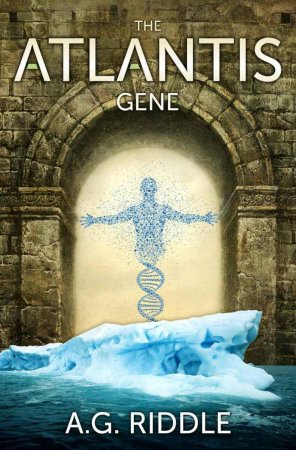 The Atlantis Gene: A Thriller
The Atlantis Gene: A Thriller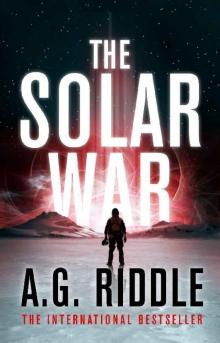 The Solar War (The Long Winter Book 2)
The Solar War (The Long Winter Book 2) The Extinction Files Box Set
The Extinction Files Box Set The Atlantis Trilogy Box Set- The Complete Series
The Atlantis Trilogy Box Set- The Complete Series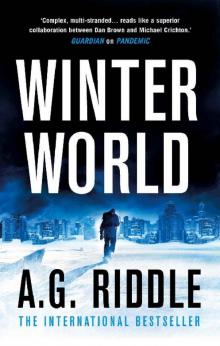 Winter World
Winter World Genome
Genome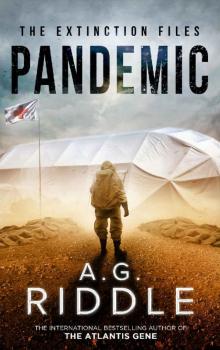 Pandemic (The Extinction Files Book 1)
Pandemic (The Extinction Files Book 1)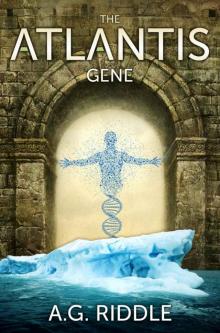 The Atlantis Gene: A Thriller (The Origin Mystery, Book 1)
The Atlantis Gene: A Thriller (The Origin Mystery, Book 1)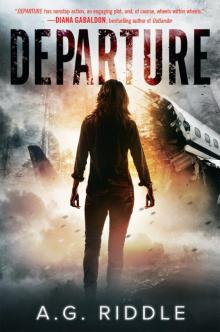 Departure
Departure Genome (The Extinction Files Book 2)
Genome (The Extinction Files Book 2) The Atlantis World (The Origin Mystery, Book 3)
The Atlantis World (The Origin Mystery, Book 3) The Atlantis Plague: A Thriller (The Origin Mystery, Book 2)
The Atlantis Plague: A Thriller (The Origin Mystery, Book 2)